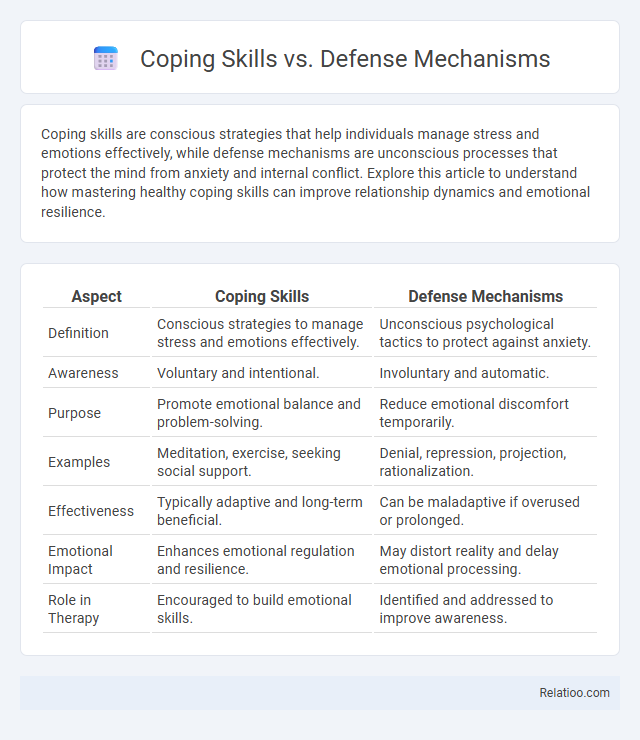Coping skills are conscious strategies that help individuals manage stress and emotions effectively, while defense mechanisms are unconscious processes that protect the mind from anxiety and internal conflict. Explore this article to understand how mastering healthy coping skills can improve relationship dynamics and emotional resilience.
Table of Comparison
| Aspect | Coping Skills | Defense Mechanisms |
|---|---|---|
| Definition | Conscious strategies to manage stress and emotions effectively. | Unconscious psychological tactics to protect against anxiety. |
| Awareness | Voluntary and intentional. | Involuntary and automatic. |
| Purpose | Promote emotional balance and problem-solving. | Reduce emotional discomfort temporarily. |
| Examples | Meditation, exercise, seeking social support. | Denial, repression, projection, rationalization. |
| Effectiveness | Typically adaptive and long-term beneficial. | Can be maladaptive if overused or prolonged. |
| Emotional Impact | Enhances emotional regulation and resilience. | May distort reality and delay emotional processing. |
| Role in Therapy | Encouraged to build emotional skills. | Identified and addressed to improve awareness. |
Understanding Coping Skills: Definition and Types
Coping skills are conscious strategies that you use to manage stress and emotional challenges effectively, promoting mental resilience and well-being. Defense mechanisms, in contrast, are unconscious psychological processes that protect you from anxiety or uncomfortable thoughts, often without your awareness. Understanding different types of coping skills, such as problem-focused, emotion-focused, and avoidance strategies, enables you to select adaptive methods for improving your emotional health.
What Are Defense Mechanisms? Key Concepts
Defense mechanisms are unconscious psychological strategies your mind employs to protect you from anxiety and emotional distress. These mechanisms, such as repression, denial, and projection, distort reality to reduce mental discomfort and maintain self-esteem. Understanding the differences between defense mechanisms and coping skills helps you develop healthier responses to stress.
Coping Skills vs Defense Mechanisms: Core Differences
Coping skills are conscious strategies individuals use to manage stress and emotional challenges, promoting adaptive outcomes and emotional resilience. Defense mechanisms operate unconsciously, protecting the ego from anxiety and internal conflicts, often distorting reality to reduce psychological distress. The core difference lies in awareness and intentionality: coping skills involve deliberate problem-solving and emotional regulation, whereas defense mechanisms function automatically without conscious control.
Healthy Coping Skills for Everyday Challenges
Healthy coping skills, such as mindfulness, exercise, and problem-solving, enable you to effectively manage everyday challenges by promoting emotional resilience and mental well-being. Defense mechanisms like denial or repression operate unconsciously and may provide temporary relief, but often hinder long-term growth and emotional health. Developing healthy coping skills empowers you to face stressors constructively, fostering adaptive responses that strengthen overall psychological stability.
Common Psychological Defense Mechanisms Explained
Common psychological defense mechanisms such as repression, denial, and projection protect your mind from anxiety by unconsciously distorting reality. Coping skills, on the other hand, are conscious strategies like problem-solving, relaxation, and seeking support that help you manage stress effectively. Understanding the difference between defense mechanisms and coping skills empowers you to improve mental resilience and emotional well-being.
The Impact of Coping Skills on Emotional Well-being
Effective coping skills directly enhance your emotional well-being by enabling adaptive responses to stress, unlike defense mechanisms that often operate unconsciously and can distort reality. Coping skills, such as problem-solving and emotional regulation, promote resilience and reduce anxiety and depression symptoms. Mastering these strategies leads to improved mental health outcomes by fostering conscious, constructive management of emotional challenges.
Defense Mechanisms and Mental Health Risks
Defense mechanisms, unlike active coping skills, are unconscious strategies your mind uses to protect itself from anxiety and stress but can hinder emotional growth and mental health stability. Relying heavily on defense mechanisms increases the risk of chronic stress, anxiety disorders, and depression by preventing you from addressing underlying problems effectively. Developing conscious coping skills promotes healthier emotional regulation and reduces mental health risks by encouraging adaptive responses to challenges.
How to Recognize Maladaptive Defense Mechanisms
Recognizing maladaptive defense mechanisms involves observing patterns where your responses consistently avoid reality or create emotional distress, such as denial, projection, or repression. Unlike healthy coping skills, which adaptively manage stress and promote resilience, maladaptive defenses often hinder personal growth and relationships by distorting perceptions. Awareness of these mechanisms allows you to identify harmful behaviors and develop healthier coping strategies for emotional well-being.
Strengthening Adaptive Coping Strategies
Strengthening adaptive coping strategies enhances emotional resilience by promoting conscious, purposeful responses to stress, unlike defense mechanisms which often operate unconsciously to protect the ego. Effective coping skills involve problem-solving, emotional regulation, and seeking social support, facilitating healthier adjustment to challenges. Developing these adaptive strategies reduces reliance on maladaptive defense mechanisms such as denial or repression, leading to improved mental health outcomes.
Choosing Healthy Responses: Coping Skills over Defense Mechanisms
Coping skills involve conscious strategies like problem-solving and emotional regulation, enabling individuals to manage stress constructively. Defense mechanisms, however, operate unconsciously to protect against anxiety but may distort reality and hinder emotional growth. Prioritizing healthy coping skills promotes resilience and adaptive functioning, whereas relying on defense mechanisms can lead to avoidance and unresolved psychological conflicts.

Infographic: Coping Skills vs Defense Mechanisms
 relatioo.com
relatioo.com